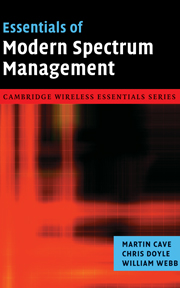Book contents
- Frontmatter
- Contents
- Acknowledgements
- I Emerging problems with the current spectrum management approach
- II Markets
- 4 Market solutions
- 5 Auctions
- 6 Spectrum trading: secondary markets
- 7 Technical issues with property rights
- 8 Economic issues with property rights
- 9 Competition issues relating to spectrum
- 10 Band management
- III Regulation
- IV Conclusions
- Further reading
- Abbreviations
- Author biographies
- Subject index
- References
8 - Economic issues with property rights
Published online by Cambridge University Press: 13 August 2009
- Frontmatter
- Contents
- Acknowledgements
- I Emerging problems with the current spectrum management approach
- II Markets
- 4 Market solutions
- 5 Auctions
- 6 Spectrum trading: secondary markets
- 7 Technical issues with property rights
- 8 Economic issues with property rights
- 9 Competition issues relating to spectrum
- 10 Band management
- III Regulation
- IV Conclusions
- Further reading
- Abbreviations
- Author biographies
- Subject index
- References
Summary
Creating property rights: economic aspects
Moving to a regime for secondary trading (as well as primary auctioning) of spectrum requires, as well as a clear technical definition of rights, a clear economic definition. As an illustration, spectrum licences in the UK have traditionally been held on an annually renewable basis, the licensee having further unspecified protection based upon a “reasonable expectation” of longer tenure. This lack of specificity would clearly create major and avoidable uncertainty in a spectrum market, and deter both transactions and the collateral investment necessary to put the spectrum to work. It is thus universally recognised that a trading regime requires a detailed specification of rights.
In principle, these rights can be embodied either in a tradable licence to use spectrum, or to install spectrum-using apparatus, or as directly owned property. In practice the tradable instrument in most jurisdictions is a transferable licence, and our discussion below is based on this approach, although we sometimes speak of “trading spectrum” rather than “trading licences”.
This chapter discusses some of the issues in the definition of licence conditions (construed as above). Section 8.2 sets out some of the basic economics of property rights. Section 8.3 considers key issues in how rights should be defined from an economic or commercial point of view. Issues concerned with technical (interference-related) aspects of property rights were dealt with in Chapter 7.
- Type
- Chapter
- Information
- Essentials of Modern Spectrum Management , pp. 123 - 138Publisher: Cambridge University PressPrint publication year: 2007

